
Few Americans have as comprehensive of a perspective on politics and media as Jen Psaki, the former White House press secretary under Joe Biden who is now the host of the The Briefing with Jen Psaki on MSNBC, as well as The Blueprint, a podcast focused on the rebuild of the Democratic party.
Rolling Stone spoke to Psaki the day after a rambling, bitter President Donald Trump aired his grievances on the international stage at the United Nations General Assembly. Shortly after Trump’s speech, Jimmy Kimmel added to the president’s umbrage by staging a cathartic return to ABC, after a corporate suspension that was shortened by public blowback to Trump’s attempts to curb free expression.
In a wide-ranging discussion, Psaki laid out her thoughts on Karoline Leavitt, the ringmaster of Trump’s circus-like White House briefing room; on Kamala Harris and her controversial new memoir; and on why national Democrats need to stop ducking fights and start punching back at bullies. (Metaphorically, of course.)
Psaki and her primetime colleagues — including Chris Hayes and Rachel Maddow — will be hosting a live event for superfans of the cable channel, called “MSNBC Live ’25,” in Manhattan on October 11. Psaki will also record the opening episode of her podcast’s second season as part of the even. This celebration is also something of a sendoff, as MSNBC prepares to spin out from its corporate parent NBC/Universal (a subsidiary of Comcast) and rebrand as the standalone MSNOW in the new year.
The following transcript has been edited for length and clarity.
Kimmel returned to the air last night. What are we learning about Trump’s ambition to control the media — and the power of consumer revolt to push back on that?
Trump is willing to use any lever of power to suppress opposition or criticism of him. And there are past models of this — the suppression of speech, suppression of comedians, suppression of entertainment — being a glide path to suppressing critics [generally]. We’ve seen a willingness to do that, and to do it out in the open — including Donald Trump’s Truth Social post last night before Kimmell even spoke, with a threat about going back at ABC for more money. [Earlier this year, ABC settled a contrived defamation suit filed by Trump for $15 million.]
Editor’s picks
What we’re learning at the same time is what John Oliver said on his show: When you give the bully your lunch money, it just makes him hungrier; he comes back for more. Giving in to an aspiring dictator does not make him stop.
Jimmy Kimmel was put back on the air thanks to a great deal of activism and a surprising group of people, including [Republican Senators] Ted Cruz and Rand Paul and others, who spoke out against the suppression of freedom of speech. Obviously, the decision was ABC and Disney’s to put Kimmell back on the air — it was not Trump deciding that. It was their response to a calculation of outside pressures. It is telling about the power of the public, and the fact that, although the president sits behind that desk, he is not all powerful.
We’re seeing an increasing body of evidence that standing up to Trump can be the strongest tactic. When Illinois Governor J.B. Pritzker stood his ground, Trump didn’t invade Chicago with the force that was threatened.
Trump is a man who has an incredibly fragile ego and thin skin. Look at the incident with the escalator at the United Nations General Assembly — where the escalator broke as he and the First Lady were stepping on. He spoke about it three or four times in his UNGA speech in front of world leaders, because he felt like it was a diss to him, as if somebody had broken the escalator [on purpose]. And then his press secretary said people should be investigated.
Related Content
That shows his fragility. And this is true of strongmen, generally, because they don’t have the majority of public support. That means standing up to them — as Pritzker has done as [California Governor] Gavin Newsom has done, as [Maryland] Governor Wes Moore has done, as people across the country have done in these massive protests — is incredibly powerful.
This episode has underscored the danger of gigantism in media. These huge corporations all have interests before the FCC, and they want to grease the skids. In that context, I want to ask you about MSNOW’s spinoff from Comcast. Do you see a path to perhaps greater freedom for you and your colleagues?
I’ve been at MSNBC for just over three years now, and I’ve never been told what I can and cannot say. Nor have I ever been told I can’t do a story. I feel very fortunate in that regard. That being said, I’m excited about the spin off. Rachel [Maddow] said this, and it stuck with me: In just a few weeks from now NBC will be our competitor. And I have every confidence that the kind of reporting and journalism and analysis [at MSNOW] is going to be different, but we’re going to be standing very much on our own two feet.
From your perspective as a former presidential spokesperson, what do you make of Karoline Leavitt and the Trump White House media setup — particularly adding these strange bloggers and streamer suckups to the mix?
They’re reshaping who’s in the White House briefing room — and slowly, but surely, turning it into a version of state-run media actors. There are still hard-hitting, excellent journalists who are in that room. They don’t get questions every day, and they’re splitting a growing amount of time with people who are raising their hands and asking about Donald Trump’s fitness routine — or giving sycophantic speeches before they ask their version of a question.
There’s no real choice for the true professionals not to participate, but their presence in the room in the end validates some of what’s happening.
The room is made up of some of the best journalists from the best news organizations in the country, even the world. That room has always been a place where there is a healthy disagreement and healthy argument between the press secretary and the people in the room. But that is [increasingly] missing. And the challenge is, it’s hard to explain that to the public.
You have a recurring segment on your show where you play clips of questions asked in the briefing room, and intercept them to give your own answer. Do you miss dunking on Steve Doocy that much, or what is the angle there?
First of all, I love that job, the challenge and the privilege of that job, because it forces you to be as good as you can be on your feet. But in this moment, where there is such tremendous disinformation being pushed out from the briefing room, our audience is looking for an accurate depiction of what’s happening. This came about because we were watching clips of the briefing one day and I’m talking back at the TV, like, What are you even talking about? That’s not what happened. Here’s what actually happened. And we decided: Why don’t we just do this to give a counter, and a more accurate version?
You brought up Trump’s performance at the United Nations. He turned that speech into a cross between Festivus — the airing of grievances — and a campaign speech. What do you take away from his decision to present the United States that way on the foremost international stage?
I’ve been to a lot of UNGAs. And it reminded me of how the world viewed people like [former Libyan strongman] Muammar Gaddafi back in the day — who would give a rambling, nonsensical speech that had no clear driving narrative, that had a lot of factual errors, and people would chuckle about in the background. Now, Trump is not Gaddafi. But it made me think: World leaders are watching the president of the United States and thinking, This can’t possibly be serious. And thinking of what U.N. officials were texting about it…
The group chats must have been spectacular.
It’s vital for the United States to be seen as a powerful leader and a powerful voice and a driver of the agenda. And that type of a speech, and the behavior surrounding it, doesn’t help us. The question is, when Trump is no longer president, how do you build that back?
That speech underscored that we have two very different modes in our national politics. There was “No Drama Obama” and the buttoned-up Biden administration — with a presentation that communicates serious adults are in charge. The contrast to that is the MAGA mein, which is bumptious and coarse. Making it up as we go along. Tell everyone Tylenol is causing autism even though there’s no evidence of that. You come from the poise-and-polish school of politics. But do Democrats need to embrace some of these coarser elements? A spirit of, “Fuck it, we’ll do it live.” Or: They’re going low. We’re going to meet them down in the gutter.
Democrats should definitely embrace “Fuck it, we’ll do it live.” But I don’t think that requires meeting them in the gutter. There needs to be a fearlessness by anybody who wants to be in any leadership role. That means punching the bully back. I don’t mean physically, obviously. I mean calling out lies, disinformation, and bad behavior. And not to be out there keeping the powder dry for the next year or two.
And it means speaking like a human. Don’t worry about the polling or the talking points. How would you talk to your neighbor about it, or call out things that are not — as my mother, who grew up in Queens, would say — “on the level”?
With Kamala Harris’ new memoir out, I’ve been thinking about this balance between rough edges and smooth polish across the trajectory of the 2024 campaign. She launched with “Kamala is brat” — the Charlie XCX vibe, a bit messy but authentic. And it seemed to have traction and energy. Tim Walz was out there calling MAGA folks “weird.” It was breaking through. And then as the campaign progressed, the campaign dialed back to a blander, more poll-tested polish, and a lot of that organic energy seemed to fizzle.
I was on the “Free Tim Walz” train. Walz propelled himself onto the ticket by being a down-to-earth accessible communicator. He was a person you could have a conversation with at the grocery store. And then you didn’t see him again. He disappeared from sight.
I assume you’ve read the memoir?
Yes. I have spent some time around the vice president. You see her humor and her directness and her feelings in the book — the frustration with being overlooked, of being underestimated. It’s very personal. I don’t think it was written through the prism of, I am a person who’s writing this book to run for president again. I have no idea if she’s going to run again.
How is it being received in the greater Biden world?
People I have spoken with in Biden world feel that there are so many big issues that we’re dealing with right now — threats to our freedoms, the threats to speech, the threats to democracy. A lot of people raised: Why write a backward-looking book? I hear that. I also think she has every right to write a book about a historic run for the presidency.
It is interesting the way she talks about her calls with Trump, and how she almost felt charmed by him. As much as he eviscerated her publicly and through ads, she had to kind of catch herself and remind herself, he’s a snake oil salesman.
Another thing is the afterword. You always have to read the afterword. I’m a nerd, so this is my recommendation. She writes that she has lived her life in public service, and has always thought that you can make change from within. But she raises the question of whether that’s still true. It’s a fundamental question of our time, right? Are our institutions prepared for the moment we’re in? I’d love to know what she means by that, what has made her change her thinking.
Your podcast is The Blueprint, which explores rebuilding the Democratic Party. You have been talking to potential future leaders. What’s new for your second season, and who do you think has the juice to meet this moment?
The first season was a bit of a therapy project. Like so many people, after the election, I was thinking, What the hell just happened? Our first season was a bit-backward looking. What should be done differently? This season is going to be much more forward looking, or that’s our intention.
We’re adding in Lis Smith, who has been a democratic consultant for a long time — worked with a lot of candidates, was one of Pete Buttigieg’s big advisers. She’s going to be a person I chat with about the moment we’re in as a part of every show. Lis never holds back ever and will probably curse so many times on the podcast, I don’t know if we’re going to have to edit it. Or maybe we just do it. It’s fine.
Trending Stories
We’re also going to have guests who are a part of the national conversation, part of the debate. We haven’t booked our whole season. In the first season, we had Pritzker and we also talked to Governor Moore, but we also talked to Jack Schlossberg, to Don Lemon, to Jamele Hill — people who are not afraid to say what they think.
As for future guests? Governor [Andy] Beshear [of Kentucky], I would love to talk to him. Zohran Mamdani — a super interesting figure who has sparked a debate about the biggest city in our country. The person who’s running Governor Newsom’s social media and hitting back at Trump. Those are interesting people to me. Sometimes I’ll write the names on the back of an envelope, and then we just reach out to people and see who’s game.



